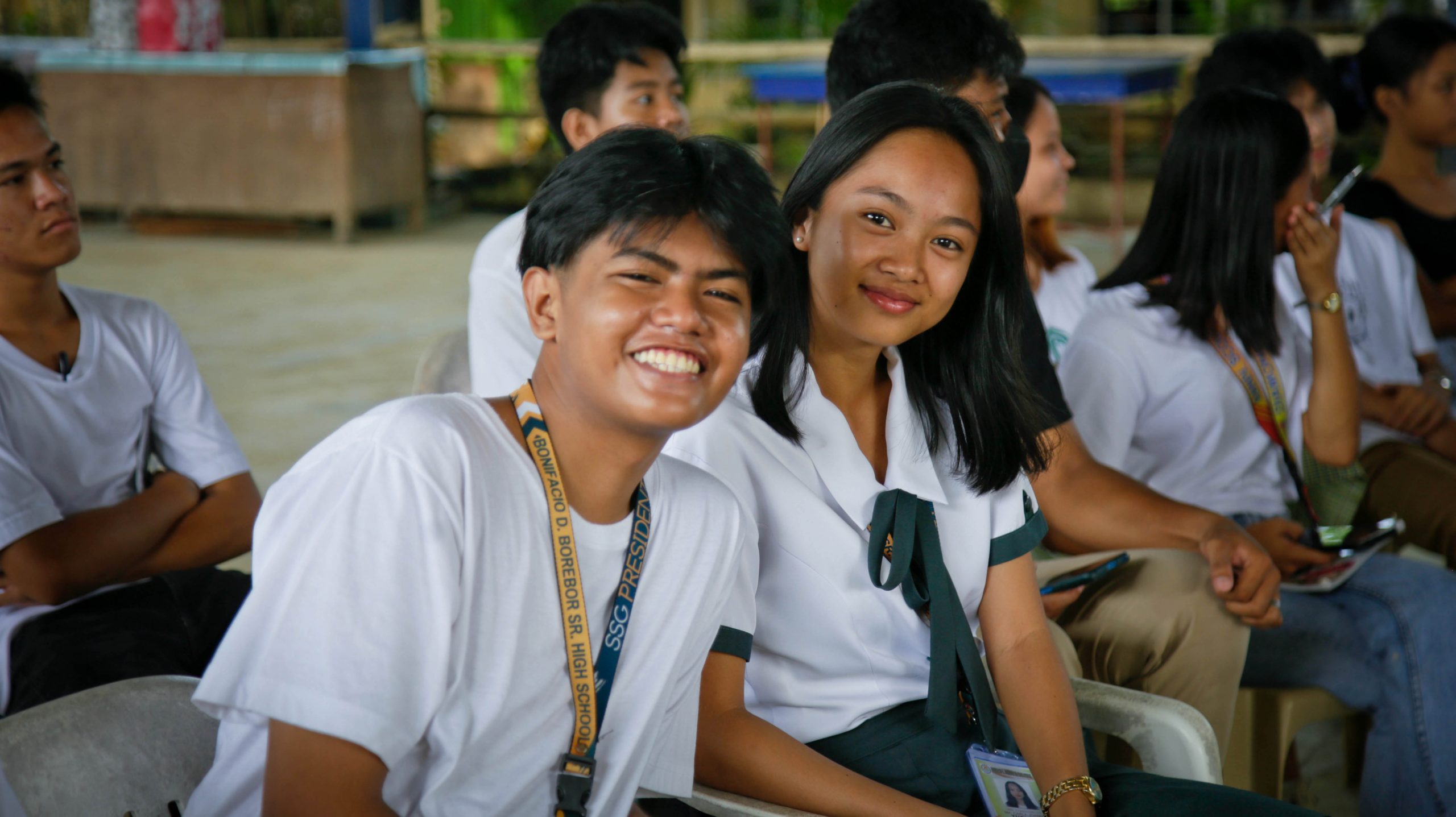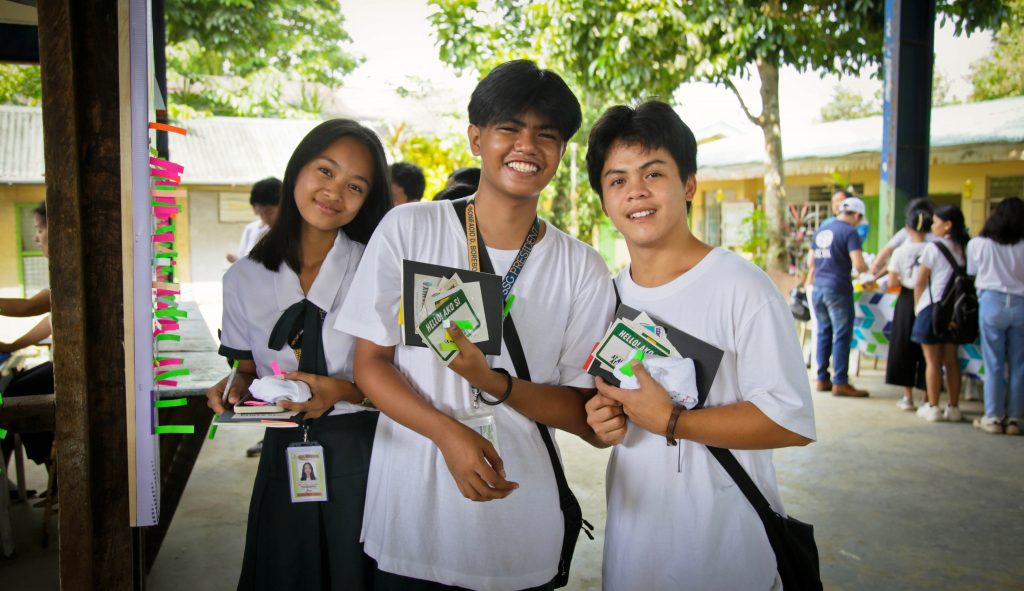Adrianne, Menstrual Cycles & Taboos
 Paving the Way for a More Inclusive Future
Paving the Way for a More Inclusive Future Adrianne is an 18-year-old young man in grade 12, attending a high school in Camarines Sur, Philippines. In May 2023, Adrianne attended an ADRA event that opened his eyes in more ways than one.
Menstrual Hygiene Awareness Campaign
As a young man, Adrianne did not know or understand much about the menstrual cycle, or the particular needs girls and women have every month. The topic on menstruation can be taboo, leaving young people ill-informed and girls and women with a sense of shame.
In May, Adrianne’s school welcomed ADRA Philippines to conduct a Menstrual Hygiene Awareness campaign. This campaign reached 32 schools across Camarines Sur. It was an initiative of the TOGETHER project.
TOGETHER, with funding from Global Affairs Canada, focuses on ensuring over 100,000 people in the Philippines, Cambodia, Kenya, and Uganda, can enjoy their health-related human rights.
While the springboard for the campaign was menstrual hygiene awareness, it encompassed more than that. It emphasized the development of healthy self-esteem in adolescents. It also informed students on the 13 Sexual and Reproductive Health Rights (SRHR), thereby addressing a broader range of issues that young people may encounter.
For Adrianne, the entire campaign was transformational.
“It was a positive experience to have our school participate in this initiative by ADRA.
“I’m particularly pleased that boys were also invited to attend, as it fosters a broader comprehension that menstruation is a natural process for women… It has increased our awareness that menstruation is entirely normal and not something to be viewed as disgusting.
“Before this, I had a rather limited understanding of menstruation, mainly because I’m a man and hadn’t delved into the topic extensively. However, I learned a great deal.”
Far from feeling that the topic was irrelevant to him, Adrianne firmly believes that it’s extremely important for boys and men to understand it.
“Even though I’m a man, it’s crucial for me to know about menstruation because women are equal to men in every way except for the fact that they menstruate, which we do not experience. I find it valuable to be aware of what women go through so that I can better empathize and support them.”


The Power of Healthy Self-Esteem
The campaign included topics on healthy self-esteem for girls and boys. This portion of the campaign deeply resonated with Adrianne, empowering him to dream bigger and higher than before.
“This activity has had a positive impact on my self-esteem. Personally, I used to compare myself to others. But after participating, I’ve come to understand that such comparisons are unnecessary and can be detrimental to our self-worth. I’ve learned that we should embrace and love ourselves without constantly measuring ourselves against others. This newfound perspective has boosted my self-esteem, making me realize that I have a lot of untapped potential and that I can accomplish more right than wrong. The activity helped us identify our strengths, the areas we excel in, what we can improve, and our aspirations in life… Self-belief is of utmost importance in reaching our goals because it means we trust ourselves.”
Adrianne also came to understand that healthy self-esteem is a form of protection.
“Developing healthy self-esteem at a young age is incredibly important because many teenagers grapple with depression and anxiety. Cultivating healthy self-esteem and self-love from a young age can significantly reduce the emotional turmoil they may experience. By wholeheartedly accepting and trusting ourselves, we can find happiness in even small achievements, without the need to constantly compare ourselves to others. Our self-acceptance becomes a crucial tool in preventing depression.”
Understanding Freedom of Choice
The campaign set up a gallery walk of the 13 Sexual and Reproductive Health Rights. This was a mechanism for informing adolescents about their rights and generating discussions.
“Now I understand the significance of having the freedom to make our own choices, especially concerning when to start a family or get married. I used to think that these decisions were solely based on customary traditions, like getting married at a certain age. However, I’ve been enlightened that we should have the autonomy to decide when and how we want to have a family. Access to health services and the right to life are also crucial because our lives are in our own hands. Before, I had no idea about these rights, but through this activity, I’ve gained a better understanding of them.”
Breaking Barriers to a More Inclusive Future
Many today, especially girls and women, face significant barriers to exercising their health-related rights. These barriers include traditional gender norms, cultural expectations, and taboos.
Through this outreach, ADRA has come alongside Adrianne and his peers in the Philippines to break down these barriers. As more youth understand their rights and the rights of others, they are more willing to change harmful perspectives and practices and stop their perpetuation. Instead, they become part of shaping a more respectful, rights-focused, and inclusive future.
Let's make a difference together!
Related News and Stories
- News Releases
An earthquake just struck Syria. Or, at least, that’s how it might seem in some...
- News Releases, Stories
In the Kulen district of Cambodia, Sonu serves as the head of the Office of...
- News Releases, Stories
In the Kulen district of Cambodia, Sonu serves as the head of the Office of...
- News Releases
Communities supported through ADRA’s STRONGER and TOGETHER projects in the Philippines have been deeply affected...